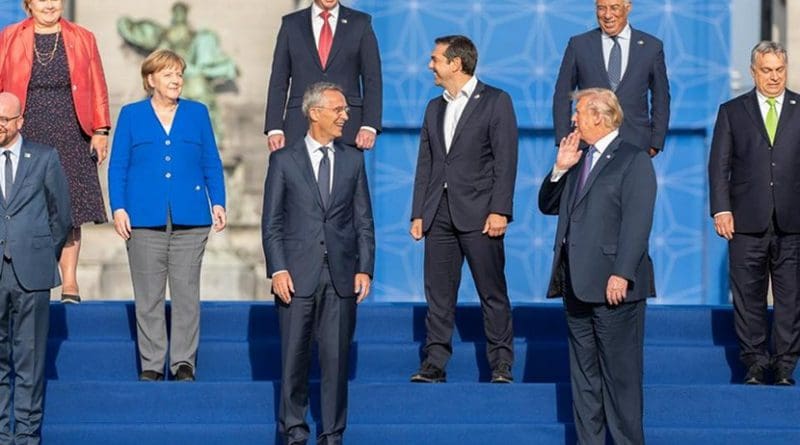Trump’s Insult To Montenegro Won’t Shatter NATO’s Credibility – OpEd
The US president has appalled NATO with his insulting language about its newest member – but the long-term damage to its standing will probably be less severe than many fear.
By Marcus Tanner*
There is nothing as embarrassing as being invited to an exclusive party – and then having a glass of wine thrown in your face the moment you come through the door.
That’s how Montenegro’s rulers feel, having just cajoled their reluctant countrymen and women into becoming part of NATO.
No sooner do they join the club than they are publicly insulted by the US President as an “aggressive” little country that is not worth defending.
NATO supporters in Europe are justifiably dismayed – their views summed up by the UK Telegraph, which called Donald Trump’s words “music to the ears of Moscow” that would damage the alliance’s credibility throughout Eastern Europe and the Balkans.
The Telegraph is right in one sense. Pro-Moscow opposition parties in Montenegro obviously are delighted to hear the American President spelling out that he couldn’t care less about the security of NATO’s newest member. It begs the question: why join in the first place?
Trump’s gaffe was astonishing also because NATO – like many clubs, or indeed, banks – runs on the basis of a comforting illusion about the parity of all its members [or customers]. One country, one seat – all equal round the table.
Of course, this is a pretence – an act. Everyone knows the US calls the shots in NATO. However, until Trump came along, the US knew the importance of masking that fact – and of clothing its initiatives with the garb of collective decision-making.
However, whether Trump’s gaffe will really shatter NATO’s credibility in Eastern or Southeast Europe is another matter.
This is because – despite Trump’s insult to Montenegro – the benefits of membership far outweigh either the costs or the obligations.
In theory, “cost” number one is subscription to Article 5, which obliges each member to join the collective defence of any other member under attack.
NATO itself insists that this principle of collective defence “lies at the very heart of NATO’s founding treaty”.
In reality, however, it is a lot less scary; the principle has never been invoked once since the alliance started in 1949.
Nor, for all the talk of Russia’s newfound “assertiveness” under Vladimir Putin, is there any sign that it will be.
Kremlin hawks in the West talk up the Russian threat, but Putin has been in power for a long time now, and throughout has been careful to confine his acts of bullying and intimidation to soft, vulnerable targets on Russia’s immediate borders.
Even in Ukraine, a vital subject to many Russians – who see it as the birthplace of the Russian state, and of Russian Orthodoxy – Putin has not indulged Russia’s hardline nationalists.
They would have loved to see Russia’s army moving full throttle towards Kiev. Instead, he has thrown them small bones – Crimea and the city of Donetsk – avoiding the risk of a full-on confrontation.
The idea that NATO membership involves any real likelihood of a bare-knuckle fight with Russia remains far-fetched.
The other “cost” of NATO membership – spending at least 2 per cent of your GDP on defence – is equally theoretical.
In practice, less than half a dozen of the 29 member states spend anything like 2 per cent of their GDP on the military.
We will see whether Trump’s latest outbursts on that subject have much effect on the rest. So far, Romania is the only NATO member that seems willing to rise to the occasion.
Those are the main club membership costs – and they are hardly onerous. The benefits, meanwhile, are tangible and immediate – a huge amount of sharing experience, training and technology.
Beyond all that useful sharing, moreover, is another less tangible, cost-free benefit of NATO membership – brand identity.
NATO membership still carries status. It is an important, recognized seal of membership of a broader “Western world”, which – even now, amid the startling rise of China – is still seen as a world worth belonging to.
It explains why countries like Albania and Croatia – far away and at no risk from Russia – wanted to joint NATO – and why club membership has soared from only 12 in 1949 to 29 today.
Joining NATO is almost like a rite of passage to adulthood, a sort of bar mitzvah – only for states.
That is why, for all the irritation felt in Podgorica, the Montenegrins are not likely to go back on their decision; nor are any other recent members.
It is not as if there is an alternative security club around, promising equal benefits.
The unloved Warsaw Pact has long gone. That leaves neutrality. But only a handful of countries, like Serbia – which looks to Russia for support over Kosovo – have much to gain from that.
Neutrality is a lonely business – fine for Switzerland, which has turned freedom from commitment into an art form – but less obviously attractive for countries in the Balkans.
The real long-term threat to NATO is an America that stops spending money on it. That would really ruin the club’s appeal – indeed, its whole point. But that has not happened, yet.
In the meantime, the Montenegrins, despite Trump’s words, should – as they say to members of upscale spas – “enjoy all the club’s facilities”.
*Marcus Tanner is an editor of Balkan Insight and the author of “Albania’s Mountain Queen, Edith Durham and the Balkans” [Tauris].
The opinions expressed in the Comment section are those of the authors only and do not necessarily reflect the views of BIRN.

